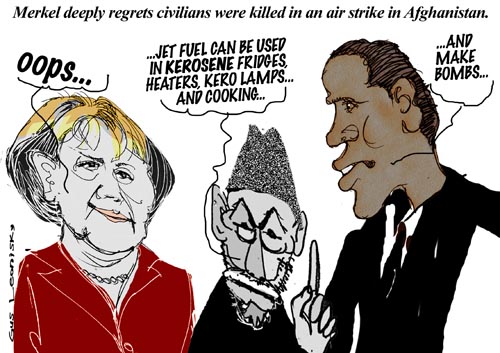Search
Recent comments
- condolences....
2 hours 30 min ago - in cold blood....
3 hours 53 min ago - LIES....
4 hours 56 sec ago - journalism....
14 hours 5 min ago - day three.....
14 hours 49 min ago - lawful law?....
15 hours 9 min ago - insurance....
15 hours 16 min ago - terrorists....
15 hours 27 min ago - nukes?...
17 hours 35 min ago - rape....
18 hours 13 min ago
Democracy Links
Member's Off-site Blogs
bomb away cooking fuel...

Germany's Chancellor Angela Merkel says she "deeply regrets" any loss of innocent life, after civilians were killed in an air strike in Afghanistan.
But Mrs Merkel told parliament that Germany's mission in Afghanistan remained necessary.
There has been heavy criticism of the strike, ordered by a German commander.
The chief of international forces in Afghanistan, US General Stanley McChrystal, has visited the scene and concluded that civilians were killed.
The incident happened on Friday, when US jets, responding to a German request, bombed two oil tankers that had been hijacked by the Taliban. Many people nearby were killed.
Mrs Merkel said in a speech to parliament on Tuesday: "Every innocent person killed in Afghanistan is one too many.
-------------------
Some people might wander why jet fuel is so sought after...? Jet fuel is kerosene or kerosine and is colourless, but when sold on the public market it is tinted with a blue dye... Kerosene is useful for domestic duties in third world countries, and as one can see from the burned out tankers, kerosine does not quite explode, but burns fiercely.
- By Gus Leonisky at 9 Sep 2009 - 5:15pm
- Gus Leonisky's blog
- Login or register to post comments
cooking fuel bombed away...
The independent Afghanistan Rights Monitor group says up to 70 civilians died in the raid, in Kunduz province.
Gen McChrystal made an Afghan TV address, promising a full investigation and stating that "nothing is more important than the safety and protection of the Afghan people".
Gen McChrystal has made avoiding civilian deaths a priority since taking over the alliance's Afghan campaign.
The Nato air strike targeted fuel tankers hijacked by the insurgents.
-----------------
see soft toon on top...
economic body count...
From Marc Herold, Ph.D, professor, department of economics and women's studies, University of New Hampshire
I have frequently been asked (and criticized) why a development economist should be concerned or know anything about, civilian casualties of war? My answer has been that in some thirty years of teaching and researching about the Third World my focus has been upon how “development” has affected the everyday lives of people. Sadly, such development has created an “economic body count.” My interest in civilian casualties explores how modern wars results in a “war body count,” severely affecting the everyday lives of simple, innocent people struggling to survive. The very same point has recently been made by the former chief economist of the World Bank, Joseph Stiglitz, in his Globalization and Its Discontents (New York: W.W. Norton, 20002) on p. 24.